BusinessEurope Headlines No. 2017-24
BusinessEurope’s priorities for the Estonian Presidency
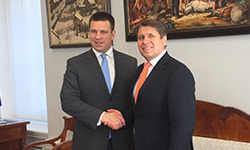 Presenting BusinessEurope’s priorities for the Estonian Presidency to Prime Minister Jüri Ratas in Tallinn on 28 June, Director General Markus J. Beyrer said: “Europe must grasp the opportunity presented by the improved economic and political climate, focus on priorities that unite and build the foundations for stronger and more secure growth across the European Union. We look forward to working with the Estonian Presidency to bring about unity through balance”. Together with the Director General of the Estonian member federation, Tomas Tamsar, Beyrer also met with the Ministry of Economic Affairs and the Government Chief Information Officer, Siim Sikkut. He emphasised that, as a frontrunner in digitalisation, Estonia is well placed to help the EU reach a genuine Digital Single Market. Photos.
Presenting BusinessEurope’s priorities for the Estonian Presidency to Prime Minister Jüri Ratas in Tallinn on 28 June, Director General Markus J. Beyrer said: “Europe must grasp the opportunity presented by the improved economic and political climate, focus on priorities that unite and build the foundations for stronger and more secure growth across the European Union. We look forward to working with the Estonian Presidency to bring about unity through balance”. Together with the Director General of the Estonian member federation, Tomas Tamsar, Beyrer also met with the Ministry of Economic Affairs and the Government Chief Information Officer, Siim Sikkut. He emphasised that, as a frontrunner in digitalisation, Estonia is well placed to help the EU reach a genuine Digital Single Market. Photos.
![]() Contact: Thérèse de Liedekerke
Contact: Thérèse de Liedekerke
Beyrer meets new EU ETS Rapporteur ahead of second round of negotiations
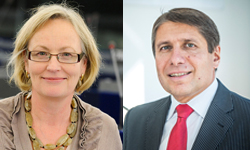 “The reform of the European Emissions Trading System (EU ETS) can bring about a good balance between ambition and carbon leakage protection. We can have a more meaningful carbon price and at the same time ensure that the best in class get enough free allowances”, said Markus J. Beyrer, BusinessEurope Director General, during a meeting on 22 June with Julie Girling, Member of the European Parliament (MEP) appointed as the new EU ETS Rapporteur. He added that the surplus in the market is due to too many auctioned allowances and that BusinessEurope supports a temporary doubling of the Market Stability Reserve: “However, we expect a significant shortage in the next phase of free allowances. Since a shortage would trigger the cross-sectoral correction factor, and nobody wants that to happen, it’s absolutely crucial that there is a 5% shift from auctioned to free allowances in case this happens”. Beyrer reminded that almost 600 MEPs voted in favour of that shift during the plenary vote in February. “The New Entrance Reserve, the Innovation Fund and other funds must be funded with auctioned allowances, because doing so with free allowances would only increase the risk of the correction factor”, he concluded.
“The reform of the European Emissions Trading System (EU ETS) can bring about a good balance between ambition and carbon leakage protection. We can have a more meaningful carbon price and at the same time ensure that the best in class get enough free allowances”, said Markus J. Beyrer, BusinessEurope Director General, during a meeting on 22 June with Julie Girling, Member of the European Parliament (MEP) appointed as the new EU ETS Rapporteur. He added that the surplus in the market is due to too many auctioned allowances and that BusinessEurope supports a temporary doubling of the Market Stability Reserve: “However, we expect a significant shortage in the next phase of free allowances. Since a shortage would trigger the cross-sectoral correction factor, and nobody wants that to happen, it’s absolutely crucial that there is a 5% shift from auctioned to free allowances in case this happens”. Beyrer reminded that almost 600 MEPs voted in favour of that shift during the plenary vote in February. “The New Entrance Reserve, the Innovation Fund and other funds must be funded with auctioned allowances, because doing so with free allowances would only increase the risk of the correction factor”, he concluded.
![]() Contact: Leon de Graaf
Contact: Leon de Graaf
Commission must take firm stance against new barriers to road transport
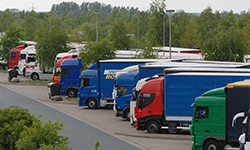 BusinessEurope Director General Markus J. Beyrer sent letters to the European Commissioner for Transport Violeta Bulc and the Director General for Mobility and Transport Henrik Hololei on 22 June to voice businesses concerns about national measures that Member States across the EU Single Market have put in place that pose obstacles to international transport operations and affect free movement. For instance, a German law that entered into force on 25 May prohibits drivers to spend their regular weekly rest on board of commercial transport vehicles. The details of the new law, which will mostly affect foreign based operators, have not been clearly communicated to the road transport sector. Therefore, BusinessEurope asks for a moratorium on the enforcement of the ban, i.e. in terms of controls and penalties, so that transport and logistics companies can adapt themselves to the new provisions. The letter also stresses that the Commission must continue to counter this worrying trend of disruptive national developments and act firmly when needed as the guardian of the EU Treaties and the Single Market itself.
BusinessEurope Director General Markus J. Beyrer sent letters to the European Commissioner for Transport Violeta Bulc and the Director General for Mobility and Transport Henrik Hololei on 22 June to voice businesses concerns about national measures that Member States across the EU Single Market have put in place that pose obstacles to international transport operations and affect free movement. For instance, a German law that entered into force on 25 May prohibits drivers to spend their regular weekly rest on board of commercial transport vehicles. The details of the new law, which will mostly affect foreign based operators, have not been clearly communicated to the road transport sector. Therefore, BusinessEurope asks for a moratorium on the enforcement of the ban, i.e. in terms of controls and penalties, so that transport and logistics companies can adapt themselves to the new provisions. The letter also stresses that the Commission must continue to counter this worrying trend of disruptive national developments and act firmly when needed as the guardian of the EU Treaties and the Single Market itself.
![]() Contact: Jeroen Hardenbol
Contact: Jeroen Hardenbol
Australia: a key partner in a fast-growing region
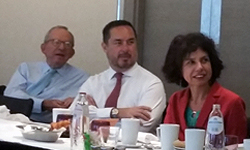 "The relevance of Australia as a strong partner of the EU in the fast-developing area of South East Asia can't be stressed enough, as this is an often underestimated aspect of a possible future EU-Australia Free Trade Agreement (FTA)" said Luisa Santos, BusinessEurope Director for International Relations, at a meeting with a delegation of the European Australian Business Council (EABC) on 28 June in Brussels. Led by Senator Mathias Cormann, Finance Minister of Australia, the meeting gathered business and institutional leaders, including the former Premier of New South Wales, the former Minister for Trade and Australian Labour Party Leader, and the CEO of Australia’s Trade and Investment Promotion Agency. “In a challenging trade environment worldwide, it is even more important for Australia and the EU to work together in support of free trade and a ruled based multilateral system”, Santos added. Participants could discuss the main opportunities and challenges of the ongoing EU-Australia FTA negotiations and also address other key developments in the EU.
"The relevance of Australia as a strong partner of the EU in the fast-developing area of South East Asia can't be stressed enough, as this is an often underestimated aspect of a possible future EU-Australia Free Trade Agreement (FTA)" said Luisa Santos, BusinessEurope Director for International Relations, at a meeting with a delegation of the European Australian Business Council (EABC) on 28 June in Brussels. Led by Senator Mathias Cormann, Finance Minister of Australia, the meeting gathered business and institutional leaders, including the former Premier of New South Wales, the former Minister for Trade and Australian Labour Party Leader, and the CEO of Australia’s Trade and Investment Promotion Agency. “In a challenging trade environment worldwide, it is even more important for Australia and the EU to work together in support of free trade and a ruled based multilateral system”, Santos added. Participants could discuss the main opportunities and challenges of the ongoing EU-Australia FTA negotiations and also address other key developments in the EU.
Contact: Luisa Santos
Fit-for-purpose policies crucial to make circular economy work
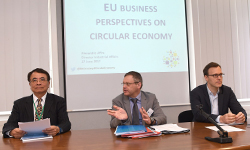 “Policymakers dealing with the shift towards a circular economy in Europe should focus on making existing policies fit-for-purpose instead of trying to patch up all problems with new regulation”, said BusinessEurope Industrial Affairs Director Alexandre Affre in a speech at the 3rd EU-Taiwan Industrial Dialogue in Brussels on 27 June. He added that businesses are making significant contributions to the circular economy and that examples can be found on the European Circular Economy Industry Platform (www.circulary.eu), a web tool managed by BusinessEurope and its national members. “From the 50 examples we’ve published so far, we can see that most challenges businesses face are not necessarily policy-related. It is important for policymakers to talk to a wide range of stakeholders to make sure that new policies do not hamper the shift towards a more circular Europe”, Affre concluded. The annual EU-Taiwan Industrial Dialogue brings together European and Taiwanese businesses and politicians to explore common areas of interest and cooperation. This year’s event focused on circular economy, smart manufacturing, 5G networks and clusters cooperation.
“Policymakers dealing with the shift towards a circular economy in Europe should focus on making existing policies fit-for-purpose instead of trying to patch up all problems with new regulation”, said BusinessEurope Industrial Affairs Director Alexandre Affre in a speech at the 3rd EU-Taiwan Industrial Dialogue in Brussels on 27 June. He added that businesses are making significant contributions to the circular economy and that examples can be found on the European Circular Economy Industry Platform (www.circulary.eu), a web tool managed by BusinessEurope and its national members. “From the 50 examples we’ve published so far, we can see that most challenges businesses face are not necessarily policy-related. It is important for policymakers to talk to a wide range of stakeholders to make sure that new policies do not hamper the shift towards a more circular Europe”, Affre concluded. The annual EU-Taiwan Industrial Dialogue brings together European and Taiwanese businesses and politicians to explore common areas of interest and cooperation. This year’s event focused on circular economy, smart manufacturing, 5G networks and clusters cooperation.
Contact: Leon de Graaf
More coherent approach to Clean Energy Package needed
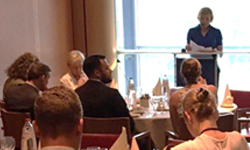 Speaking at an event on clean energy hosted by the Member of the European Parliament Henna Virkkunen on 20 June, BusinessEurope Senior Adviser Jan Bambas stressed that the EU institutions need to be aware not to overlap policies or have incoherencies between dossiers. For instance, regarding the Clean Energy Package and other instruments, such as the EU Emissions Trading System (EU ETS), the institutions should evaluate if there are possible overlaps and what would be their impact, since competing objectives pose major risks for all stakeholders. During the event, supported by Nordic energy companies, the consulting firm Pöyry presented a study on the overlaps of the Clean Energy Package and a quantification of their impact on the EU ETS. Participants agreed that a more robust evaluation system and evidence-based approach is needed to deliver on Europe’s climate and energy goals. Strengthening ambitions for some instruments could undermine the decarbonisation efforts instead of increasing complementarity. Bambas also mentioned the proposal on Governance of the Energy Union, which should pay more attention to competitiveness, as required by the European Commission communication on the Energy Union framework.
Speaking at an event on clean energy hosted by the Member of the European Parliament Henna Virkkunen on 20 June, BusinessEurope Senior Adviser Jan Bambas stressed that the EU institutions need to be aware not to overlap policies or have incoherencies between dossiers. For instance, regarding the Clean Energy Package and other instruments, such as the EU Emissions Trading System (EU ETS), the institutions should evaluate if there are possible overlaps and what would be their impact, since competing objectives pose major risks for all stakeholders. During the event, supported by Nordic energy companies, the consulting firm Pöyry presented a study on the overlaps of the Clean Energy Package and a quantification of their impact on the EU ETS. Participants agreed that a more robust evaluation system and evidence-based approach is needed to deliver on Europe’s climate and energy goals. Strengthening ambitions for some instruments could undermine the decarbonisation efforts instead of increasing complementarity. Bambas also mentioned the proposal on Governance of the Energy Union, which should pay more attention to competitiveness, as required by the European Commission communication on the Energy Union framework.
Contact: Jan Bambas
Calendar 
- 1 July 2017: Estonian presidency
- 7-8 July 2017: 12th G20 summit, Hamburg
- 12 July 2017: Single market strategy for goods and services